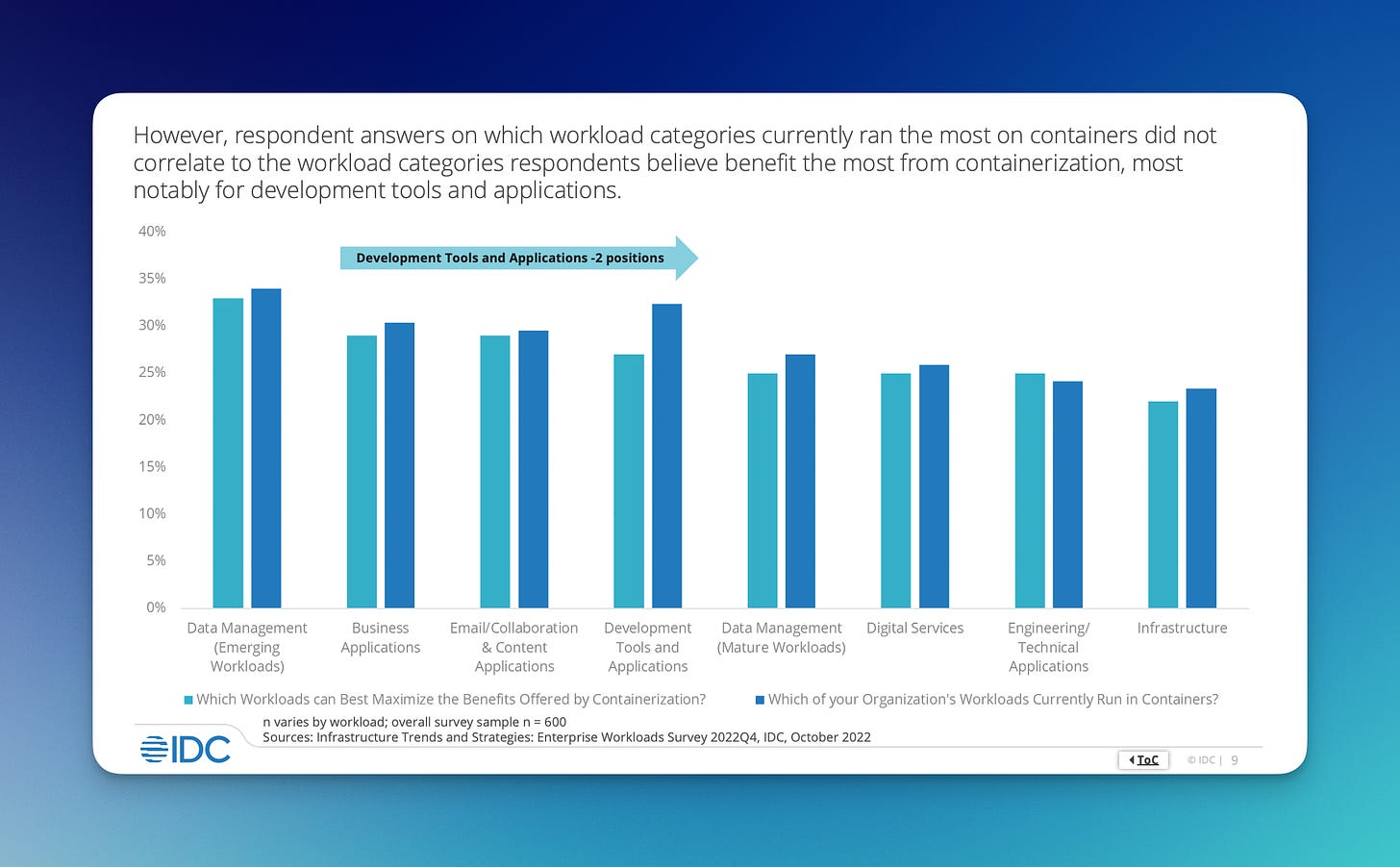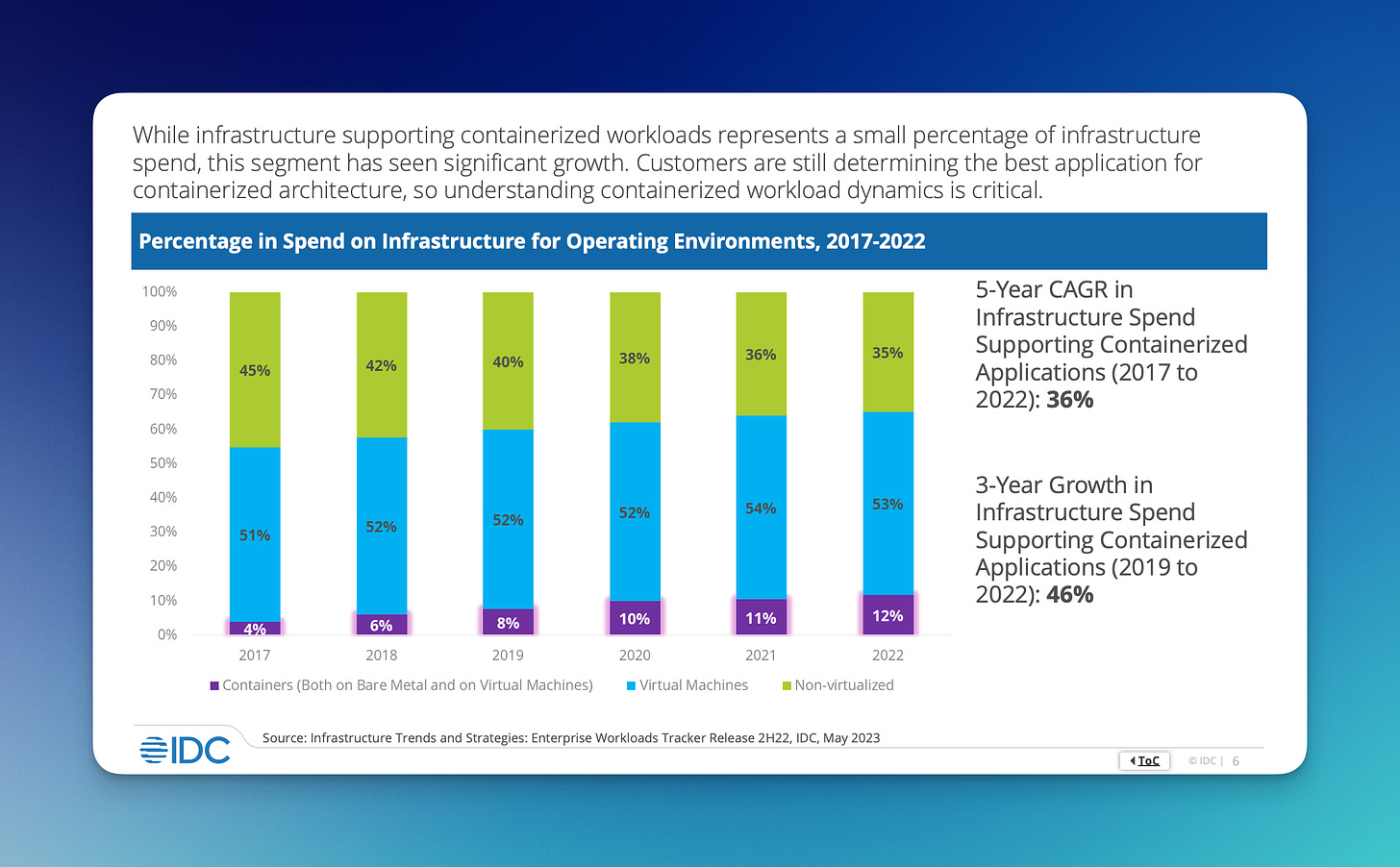PSA: I recommend that you use your personal email address to subscribe to this newsletter. We're approaching and in layoff and job change season. Starting now to the end of the CY/FY, bonuses are paid out, promotions have been denied or gained, etc. If you're subscribed with your work email, consider switching to a personal email address.
📨 📨 📨 📨 📨
Hunting for the cloud native and kubernetes pay-off
This is an excerpt from my talk yesterday with Bryan Ross, his theory here is fun, clever, and probably right:
Check out the full interviews, I liked it a lot. The podcast version will be in the Tanzu Talk feed tomorrow if you want to subscribe to that and catch it while you’re vacuuming the floors this weekend.
Container usage by workload in enterprises, share of wallet, and plans
You know I love getting more info on how much container usage (and, thus, an indicator of Kubernetes usage) there is in enterprises. IDC has a deck of charts out looking into what survey respondents say are good uses of containers and where they run containers. Here’s one chart. It shows which types of workloads actually run in containers versus what people think is a good idea:

Here’s a comparison of spend on “traditional” infrastructure versus containers. Spend doesn’t represent an actual count of applications running in containers (the pricing for each unit of infrastructure could be very different, all the way to free!), but it’s useful nonetheless.

What’s worth noticing here is (1) spend on virtualization has been flat. This suggests that, at least when it comes to share of wallet, virtualization is not being reduced by containers - though growth certainly is. That said, you could also say that containers are reducing virtualization, but that virtualization is picking up workloads from non-virtualized infrastructure. (2) More importantly, there’s a big growth in spend on containers (which we can feel safe in saying means a rise in importance of containerized workloads, and probably growth in those applications).
Software vendors - any company! - love and focus on growth, even if it’s in absolute terms tiny year/year of year. It sound much cooler to say that you’re involved in a market that has a 46% growth than, like, 0%…even if there’s shit-tons more money in the 0% growth company. But, you gotta chase those new dollar bills.
Finally, people’s plans. I don’t put too much stock in plans (as you may recall, moving all the workloads to public cloud has been just around the corner for about 10 or 15 years now). But, this is great for gauging people’s interest, especially for vendors who are hunting out what to sell, what to talk about, and how to drive interest for sales meetings. You know, and actual predicting about the future use of containerized workloads:

Again, the most obvious take-away is that there’s more growth in container usage, And, again, the important thing to temper your glee with is that the growth should be a combination of new workloads and migrating old works, i.e., this isn’t a “share” of containers versus traditional workloads.
Also, if you look at the charts, the container label is “Containers (Mounted in Virtual Machines and Bare Metal).” That’s a complicated! So, for some number of containers, we still have traditional infrastructure in use. The containers are more providing (yet another!) layer of packaging, execution, and management for apps on-top of already existing types of infrastructure.
As ever, we’re in the eternal first inning of cloud.
The charts have some further splicing up of the responses which is useful. For example, some of the charts separate out SaaS companies from others, which gives you a better picture of what “normal” organizations are doing (SaaS companies seem to use containers a lot more, as you’d expect). Also, there’s cuts on company size: companies with a 1,000+ people seem to use containers more than smaller companies. Check ‘em out if you have access (you likely do if you’re in a big tech company), or want to fork over $4,500.
Open source and security? The Conference!
Isabel Drost-Fromm sends me this: "in the wake of the Log4Shell kerfuffle I talked to several friends - all of them told the same story of professional engineering teams struggling to figure out whether or not they are affected back then. As a result with a few friends I started FOSS Security Campus, trying to address both, beginners through trainings and advanced engineers through the talk schedule. " It’s in Berlin, Sep 26th to 29th this year. Check it out!
Wastebook
“I guess that’s the power of a good sandwich.” Here.
“It occurred to me finally that I was listening to a true underground, to the voice of all those who have felt themselves not merely shocked but personally betrayed by recent history. It was supposed to have been their time. It was not.” The White Album, Joan Didion
“To be clear, I think the paradigm of let[ting] people enjoy things was borne of good intentions, but it has demonstrably resulted in a deluge of crap. There’s good stuff in there, but it’s more jetsam than flotsam: hard to find, harder still to get a hold of.” Here.
“Hah…I love that story…” Life-hack on how to make boring stories funny.
What replaces the smoke break?

Smoking used to be a little time for a break, often standing up and walking outside. A time to touch grass, in big cities, more often concrete.
I like the romance of the smoke break, also the relaxing feel of it. Almost an off moment of mindfulness.
Now, I suspect people "check their phone" is the little break. But that doesn’t seem the same.
I suppose you could have an espresso, or a quickly to make a small tea? Get a cup of one of those and go outside to drink it, looking around aimlessly and talking idly with whoever is doing the same?
It can’t be eating something, or, like “taking a walk.” Those are their own things. But, the Swiss have a culture of interstitial meals, one at nine between breakfast and lunch, another at four between lunch and dinner.
But all that doesn't seem exactly the same as a smoke break - healthier, sure. There must be something.
Having never smoked, I've never really experienced "smoke breaks," but it seems...nice?

Relative to your interests
Fantasy Meets Reality - “If it looks neat, people will want to take a photo with it. If it looks comfortable, people will want to sit on it. If it looks fun, people will play around on it.”
Shadow IT guidance - Advice from the UK government: “Though clearly not desirable, the existence of shadow IT presents your organisation with learning opportunities. If employees are having to resort to insecure workarounds in order to ‘get the job done’, then this suggests that existing policies need refining so that staff aren’t compelled to make use shadow IT solutions. Security people should focus on finding where shadow IT exists, and where possible, bring it above-board by addressing the underlying user needs that shadow IT is seeking to address.” // Shadow IT exists because people need something that IT is not giving them.
The Super App Window Has Closed - “58% of online adults in metro China said that they trust the content that brands post on social media, compared with just 20% in the US” // As someone quipped on The Dithering Podcast, no one is going to trust their money to the Bank of Twitter, let along “X Bank.”
Where’s Assaf? - Holy shit! That is scary to hear and I’m glad he is recovering.
Paul Reubens, Creator of Pee-wee Herman, Is Dead at 70 - “I have loved you all so much and enjoyed making art for you.”
Why haven’t internet creators become superstars? - “Internet stardom bestows no glamor.”
What the New Relic Sale Means for SaaS - Time to go start Wily 3.0! (Well, in two to three years when the exec’s vesting wraps up.)
Experts expect Sumo Logic match post-New Relic acquisition - I would not recommend “fusing” together any two software portfolios that are more than two - maybe three - years old. // “Further, multiple industry analysts predicted that New Relic and Sumo Logic will be fused under their new owners to create a broader set of products to better compete with vendors such as Datadog and Splunk.”

Upcoming
Talks I’ll be giving, places I’ll be, things I’ll be doing, etc.
Sep 6th O’Reilly Infrastructure & Ops Superstream: Kubernetes, online, speaking. Sep 6th to 7th DevOpsDays Des Moines, speaking. Sep 13th, stackconf, Berlin. Sep 14th to 15th SREday, London, speaking (get 50% of registration with the code 50-SRE-DAY) Sep 18th to 19th SHIFT in Zadar, speaking. Oct 3rd Enterprise DevOps Techron, Utrecht, speaking. Nov 6th to 9th VMware Explore in Barcelona, speaking.
Logoff
se landscapes from Oswald Achenbach are amazing. I saw one in the Musee D’Orsay (used above), and, as with all paintings that play with light, you can’t really tell from the screen how magical it is. Here’s another one, you canost imagine what it’d look like in person:
